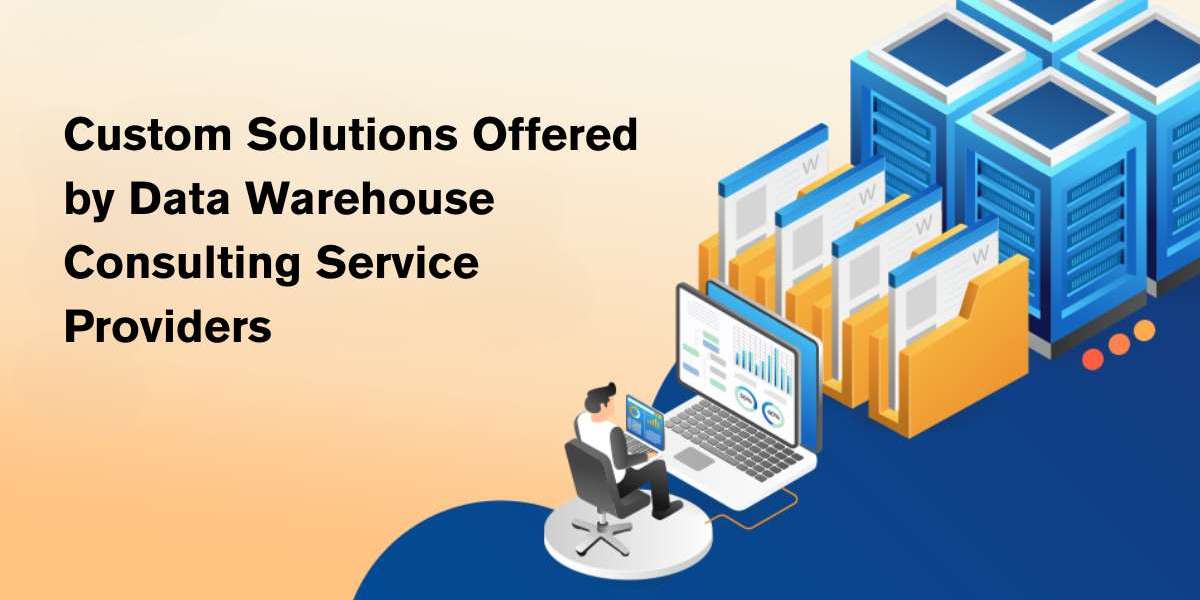In today's data-driven business environment, organizations rely heavily on data warehouses to consolidate, manage, and analyze large volumes of data. Data Warehouse Consulting has become essential for businesses aiming to build efficient, scalable, and tailored data infrastructure. Consulting services help companies design and implement data warehouse solutions that fit their unique needs, ensuring better decision-making and competitive advantage.
What is Data Warehouse Consulting?
Data Warehouse Consulting refers to professional services aimed at helping businesses build efficient, scalable, and high-performing data warehouse systems. Consultants evaluate business needs, select appropriate technologies, and implement systems to store, organize, and analyze data effectively. The goal is to turn complex, raw data into accurate and usable information for decision-making, compliance, and forecasting.
1. Assessing Business Requirements and Existing Data Systems
Consultants begin by analyzing the client’s business goals, existing databases, software, and reporting workflows. This assessment helps identify pain points, data silos, and process inefficiencies. They map out what data is needed, its sources, and how it should be stored and accessed to support the organization’s operational and analytical needs.
2. Designing Data Warehouse Architecture
Based on the assessment, experts design the data warehouse structure. This includes selecting between cloud or on-premise platforms, defining data schemas, and choosing whether to use star, snowflake, or hybrid schemas. A well-designed architecture supports scalability, security, and performance while meeting data access and processing requirements across departments.
3. Developing ETL (Extract, Transform, Load) Processes
ETL development is central to data warehouse consulting. Specialists build pipelines to extract data from multiple sources, clean and format it, and load it into the warehouse. These processes are tailored to each client’s data structure and rules, ensuring high-quality, consistent data for analytics and reporting.
4. Integrating Multiple Data Sources
Consultants unify data from various systems such as CRMs, ERPs, APIs, IoT platforms, and third-party apps. This involves designing connectors and middleware that pull data into a single warehouse. Effective integration eliminates silos and enables a 360-degree view of operations, improving the accuracy of insights and forecasts.
5. Ensuring Data Quality and Governance
A key focus of consulting is to maintain reliable and clean data. Consultants implement rules for validation, duplication checks, and error handling. Governance strategies are also defined, including data ownership, audit trails, access controls, and compliance with regulations such as GDPR or HIPAA, depending on the industry.
6. Providing Training and Support
After deployment, consulting teams offer ongoing support and training. They educate teams on using dashboards, running queries, and creating custom reports. This ensures internal adoption and long-term success of the data warehouse. Support may also include performance tuning, bug fixes, and scaling the system as data volume grows.
Why Custom Data Warehouse Solutions Matter
Every organization’s data landscape differs based on its industry, size, technology stack, and business goals. Off-the-shelf data warehousing products often lack the flexibility to accommodate complex data workflows or specific compliance requirements.
Custom data warehouse solutions offer:
1. Tailored Architecture Suited for Unique Data Volumes and Sources
Data Warehouse Consulting Services design architecture based on specific data types, volumes, and access needs. This includes choosing between cloud, hybrid, or on-premise infrastructure. The architecture supports structured and unstructured data, ensuring efficient storage and retrieval. Consultants also plan for future scalability, so the system remains robust as the business collects more data from diverse sources.
2. Optimized ETL Pipelines for Faster Data Processing
Consultants develop customized ETL (Extract, Transform, Load) processes that reduce latency and handle high data throughput. The pipelines are fine-tuned to manage real-time and batch data flows from various sources. This speeds up analytics and ensures that data in dashboards or reports is always up-to-date, which is essential for time-sensitive business decisions.
3. Integration with Existing Systems and Third-Party Applications
A core service includes integrating the data warehouse with CRM, ERP, marketing, and operational platforms. Consultants build APIs and connectors that automatically feed relevant data into the warehouse. This integration helps create a centralized view of business activities, improves collaboration between departments, and supports advanced analytics without requiring manual data consolidation.
4. Customized Security Policies Ensuring Regulatory Compliance
Data Warehouse Consulting experts implement role-based access controls, encryption, and logging to protect sensitive data. They tailor security settings to meet standards like GDPR, HIPAA, or SOC 2, depending on the industry. These policies prevent unauthorized access, ensure audit readiness, and safeguard customer and business data from breaches or internal misuse.
5. Adaptability to Evolving Business Needs and Data Growth
Consultants design systems that evolve with business goals and increasing data loads. This includes modular architectures and support for cloud-native features like auto-scaling and on-demand storage. As the company expands or adds new tools, the warehouse can accommodate changes without disrupting existing workflows, ensuring long-term performance and cost efficiency.
Core Custom Solutions Provided by Data Warehouse Consulting Services
1. Data Warehouse Architecture Design
Consulting services design tailored data warehouse architectures to match business needs. They select between Enterprise Data Warehouses (centralized data hubs), Data Marts (department-specific), Hybrid Architectures combining both, or Cloud Data Warehouses using platforms like AWS Redshift or Google BigQuery. These designs consider data volume, types, update frequency, and analytics needs to deliver scalable, high-performance systems optimized for reporting and insights.
2. ETL Process Customization
Consultants develop ETL workflows that automate data extraction from diverse sources, apply complex business transformations, and load data efficiently. They offer real-time or batch processing based on latency requirements. Error handling, data validation, and integration with tools like Apache NiFi or Informatica ensure high data quality. Customized ETL pipelines reduce data latency and errors, making analytics trustworthy and timely.
3. Data Integration and Migration
Consulting firms unify data from ERP, CRM, cloud apps, and IoT devices by mapping and normalizing diverse data formats. They design migration plans that reduce downtime and data loss. Using APIs and connectors, consultants integrate legacy and cloud systems smoothly. Handling structured and unstructured data, these integrations enable comprehensive, cross-departmental insights critical for informed decision-making.
4. Performance Tuning and Optimization
Consultants enhance data warehouse speed and efficiency through indexing, partitioning, and workload management. They implement compression and archiving to control storage costs and use monitoring tools for continuous diagnostics. These optimizations enable fast query responses and support many concurrent users, ensuring reliable, scalable access to data reports and analytics even under heavy workloads.
5. Data Governance and Security Customization
Protecting sensitive data and ensuring compliance drives governance strategies. Consulting services implement role-based access controls, data masking, and encryption to secure data at rest and in transit. They define stewardship policies and audit trails aligned with regulations like GDPR and HIPAA. Proper governance reduces legal risks and prevents unauthorized data access, safeguarding business and customer information.
Technical Tools and Technologies Used
A Data Warehouse Consulting Company employs various technical tools to deliver custom solutions:
1. Database Systems
Data Warehouse Consulting Services leverage robust database systems like Oracle, Microsoft SQL Server, Snowflake, and Teradata. These platforms offer scalable storage, high-performance querying, and advanced analytics capabilities. Snowflake and Teradata excel in cloud-based and hybrid environments, while Oracle and SQL Server provide strong on-premises options. Choosing the right database depends on business size, data volume, and workload types.
2. ETL Tools
ETL processes rely on tools such as Apache Airflow, SQL Server Integration Services (SSIS), and Talend to automate data extraction, transformation, and loading. Apache Airflow offers flexible workflow orchestration, SSIS integrates tightly with Microsoft environments, and Talend supports broad data source connectivity. These tools improve efficiency, manage dependencies, and ensure high data quality in complex ETL pipelines.
3. Cloud Platforms
Cloud platforms like Amazon Web Services (AWS), Microsoft Azure, and Google Cloud Platform (GCP) enable scalable and cost-effective data warehouse deployments. AWS offers services like Redshift for analytics, Azure supports Synapse Analytics, and GCP provides BigQuery. These platforms allow on-demand resource scaling, reduce infrastructure management overhead, and support seamless integration with diverse data and analytics tools.
4. BI and Analytics Tools
Business intelligence tools such as Tableau, Power BI, and Looker are essential for data visualization and reporting. Tableau excels in interactive dashboards, Power BI integrates well with Microsoft ecosystems, and Looker offers robust data modeling. These tools connect directly to data warehouses, enabling users to create insightful reports, track KPIs, and support data-driven decision-making across organizations.
5. Data Orchestration
Data orchestration platforms like Apache Kafka and Apache NiFi manage the real-time flow and processing of data streams. Kafka provides a high-throughput, fault-tolerant messaging system for continuous data pipelines. NiFi offers drag-and-drop data routing and transformation capabilities. Together, they ensure reliable, scalable ingestion and integration of diverse data sources into data warehouses.
6. Monitoring
Monitoring solutions such as Prometheus and Grafana provide essential observability for data warehouse systems. Prometheus collects and stores metrics on system performance and health, while Grafana visualizes these metrics in customizable dashboards. This combination helps teams detect performance bottlenecks, monitor ETL jobs, and ensure system uptime, supporting smooth data operations and rapid troubleshooting.
Case Examples of Custom Data Warehouse Solutions
Example 1: Retail Chain Data Warehouse
A retail company with multiple store locations faced challenges integrating sales, inventory, and customer data. The consulting provider created a hybrid data warehouse combining cloud and on-premises systems. Customized ETL pipelines automated daily data ingestion from POS systems, reducing manual effort by 50%. As a result, sales reporting speed improved by 35%, enabling faster decision-making.
Example 2: Healthcare Data Consolidation
A healthcare provider required strict compliance with HIPAA and needed to unify patient records across clinics. The consulting team designed a secure, compliant data warehouse with fine-grained access control. Real-time ETL workflows ensured up-to-date patient information availability. The solution enhanced data accuracy and helped detect treatment trends faster.
Advantages of Hiring Data Warehouse Consulting Services
1. Expertise Access
Data Warehouse Consulting Services provide access to specialized skills and deep technical knowledge. Experts bring experience with diverse industries, architectures, and tools, accelerating design and implementation. Their guidance avoids common pitfalls, ensures best practices, and tailors solutions to business goals. This expertise reduces project risk and enhances the overall quality and effectiveness of the data warehouse.
2. Cost Efficiency
Consulting services help businesses avoid costly mistakes during data warehouse design and deployment. Efficient ETL pipelines and scalable architecture minimize unnecessary resource use. Proper planning reduces long-term maintenance and operational expenses. By focusing on essential features and technologies, these services optimize budget allocation, ultimately lowering total cost of ownership and increasing financial sustainability.
3. Scalability
Consultants design data warehouses with scalability in mind, allowing systems to handle growing data volumes and user demands. They recommend architectures that support horizontal and vertical scaling, cloud elasticity, and modular components. This future-proofing ensures the data warehouse can evolve with changing business needs, avoiding costly redesigns and downtime as the organization expands.
4. Faster ROI
Optimized data warehouse solutions accelerate data availability and reporting speed, enabling quicker business insights. Faster access to accurate data supports timely decision-making, improving operational efficiency and competitive advantage. Early realization of value from the investment shortens the return on investment (ROI) timeline, making data-driven strategies more effective in generating revenue growth.
5. Compliance Assurance
Data Warehouse Consulting Services ensure that data governance and security policies align with relevant regulations such as GDPR, HIPAA, or CCPA. They implement role-based access controls, encryption, and auditing measures. This compliance reduces legal risks, safeguards sensitive information, and builds customer trust, which is critical in industries handling regulated or personal data.
Challenges and How Consulting Services Address Them
1. Complex Data Sources
Data Warehouse Consulting Services analyze diverse data sources thoroughly, mapping each to a unified model. They handle heterogeneous formats including structured, semi-structured, and unstructured data. Custom extraction and transformation processes ensure that data from ERP, CRM, IoT, and cloud systems integrate seamlessly. This detailed source analysis prevents inconsistencies and supports accurate, holistic reporting.
2. Data Quality Issues
Consultants implement robust data validation, cleansing, and enrichment routines to ensure data accuracy and consistency. They identify anomalies, duplicates, and missing values early in ETL processes. Continuous monitoring and error handling prevent corrupt data from entering the warehouse. High data quality builds user trust and drives reliable analytics outcomes for confident decision-making.
3. Changing Business Needs
To address evolving requirements, consulting teams apply agile methodologies enabling iterative development and continuous improvement. This flexibility allows incremental feature additions and performance tuning without disrupting operations. Adaptive data models and modular architectures accommodate new data sources, reports, or compliance changes, keeping the warehouse aligned with business goals over time.
4. Integration with Legacy Systems
Many enterprises rely on legacy systems that lack modern interfaces. Consulting services use API development, middleware, and custom connectors to bridge these systems with data warehouses. This expertise enables smooth data flow, preserving historical data while allowing real-time integration. Effective legacy integration maximizes existing investments and prevents data silos.
Conclusion
Data Warehouse Consulting Services play a vital role in designing and implementing tailored data warehouse solutions that meet specific business requirements. From architecture design to security and performance tuning, consulting firms provide end-to-end expertise. Custom data warehouses enable faster analytics, improved data quality, and regulatory compliance, all of which contribute to better business outcomes.
Choosing a professional Data Warehouse Consulting Company ensures a strategic approach, reduces risk, and maximizes the value of enterprise data assets.



